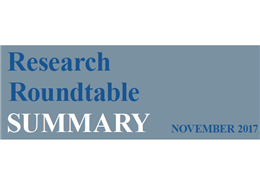 In August 2017, the board held a roundtable discussion in Washington, DC with scholars from around the country who were asked to suggest ideas for a long-range Social Security research agenda and to discuss the data needs they think are required to carry out that agenda. Additional scholars who did not attend the meeting submitted written suggestions. The document being released today summarizes thoughts and recommendations from over 30 individuals who participated in this process. The points made in this report do not necessarily reflect or represent the views of individual board members and are not exhaustive of all the important insights that other researchers and experts may have to offer. Still, they highlight a number of issues the board hopes the public and the Social Security Administration will find useful to consider.
In August 2017, the board held a roundtable discussion in Washington, DC with scholars from around the country who were asked to suggest ideas for a long-range Social Security research agenda and to discuss the data needs they think are required to carry out that agenda. Additional scholars who did not attend the meeting submitted written suggestions. The document being released today summarizes thoughts and recommendations from over 30 individuals who participated in this process. The points made in this report do not necessarily reflect or represent the views of individual board members and are not exhaustive of all the important insights that other researchers and experts may have to offer. Still, they highlight a number of issues the board hopes the public and the Social Security Administration will find useful to consider.
Most participants emphasized the need for additional investments in data infrastructure and greater access to and sharing of the administrative data necessary to address key research questions. Some recommended continuing the development of policy evaluation models and suggested a number of topics that could be addressed through demonstration projects. Among the numerous issues identified, some notable examples include the need to better understand:
- What factors contribute to the economic security or insecurity of retirees
- How changing patterns of work, health, retirement, asset and debt accumulation and decumulation will affect the economic security of today’s workers
- How SSA’s communication with the public affects decision-making by workers, claimants and beneficiaries
- How disabilities develop, how SSA determines eligibility for benefits and what conditions are necessary for individuals to keep working or to return to work
- The reasons for and implications of recent downward trends in disability applications and awards